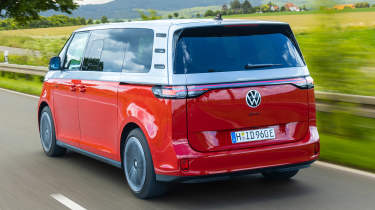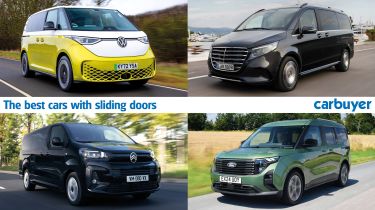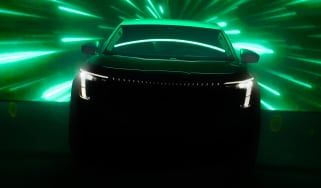Volkswagen ID. Buzz review – retro surfer bus reinvented as an EV


Sliding doors might not be the flashiest new-car feature, but they can make all the difference for buyers who value practicality and accessibility. They were once the hallmark of MPVs, but shifting buyer tastes towards SUVs mean that there are only a handful left to pick from. Still, the ones that remain are some of the roomiest and most practical cars on sale.
Sliding doors can make getting in and out of your car much easier than traditional doors, especially in tight parking spaces or when you're juggling shopping bags and a restless toddler. They’re also great for accessibility, giving a wide, unobstructed entry point that’s perfect for those who need a bit more room to manoeuvre.
 The top 10 best family cars 2025
The top 10 best family cars 2025
In this guide, we’ll take a look at the 10 best cars with sliding doors available today. Most are big seven-seater cars with van-based origins, but there are a couple of smaller options for those who don’t need quite such a cavernous interior. There are even a few fully-electric models, which could be ideal for those who live in urban areas and stick to relatively short trips.
Before heading to a dealership, it’s worth noting two important points about cars with sliding doors. Firstly, they can be expensive. You might be able to find a large SUV or a seven-seater car for less than some of these MPVs, so it’s worth considering whether sliding doors are worth the added cost for you.
Secondly, sliding doors can sometimes be heavier than regular doors. If you choose one of the larger cars on this list, you may find the doors hard to slide, particularly if you’ve parked on a slope. They may require a fair pull and shove to get open and are noisier to open and close than hinged doors. If, however, the car you’re after has a power-opening and closing option, this makes things easier and more convenient – at a price.
Read on for our list of the best cars with sliding doors. We’ve also covered the best Motability cars for those who qualify for the scheme, while we also have a broader list of the best people-carriers and MPVs.
The ID. Buzz is one of the newest MPVs on the market. It’s fully electric and all models have sliding doors, whether you go for the five-seater or seven-seater version.
Despite the EV tech, the ID. Buzz doesn’t have a cutting-edge look, but instead taps into the nostalgia of the old VW Microbus. It’s certainly not missing any modern technology inside, however, and is even equipped with 185kW fast charging as standard. This means a top-up from 10 to 80% in around 30 minutes if you can find a powerful enough public charger.
Its range of around 290 miles will be enough for most owners, and the standard equipment list is very impressive. However, all of this comes at a cost – whereas the original was an affordable model from the manufacturer of ‘the people’s car’, its starting price of just under £59,000 makes the ID. Buzz one of the most expensive cars on our list. You’ll need to own it for quite a while and cover lots of miles to recoup that extra outlay.
The Multivan is Volkswagen’s replacement for the firm’s discontinued Caravelle MPV. Aside from just a name change, the Multivan offers some big upgrades over its predecessor. The Multivan has a slick design, but unlike the ID. Buzz above, all available powertrains involve some use of petrol or diesel.
The Multivan is available with either a 201bhp 2.0-litre petrol engine, 148bhp 2.0-litre diesel or as a four-wheel drive plug-in hybrid. The latter pairs a petrol engine with a 20kWh battery to produce 241bhp; it has an all-electric range of nearly 60 miles which will keep running costs down on short trips, but it’s the priciest of the trio to buy.
While it is quite expensive, every version of the Multivan is well equipped, with entry-level Life models getting a host of included safety features and electrically latching sliding doors – go a step up to a Style model and you’ll get fully electric sliding doors which will help with getting children in and out of the car. The Multivan’s rear seats sit on rails which allow them to be rearranged and turned 180-degrees, which adds to its versatility. A fold-out table, multiple cup holders and USB charging ports also mean there’s lots on offer to keep rear passengers happy.
As the biggest MPV Ford offers, the Tourneo Custom stops just short of being a fully-fledged minibus. It’s based on the Ford Transit van, which itself is very popular, and is capable of seating up to an impressive nine people. It has individual seats that can be rearranged to face each other for a more social set-up or removed entirely, freeing up the MPV’s van potential – the Tourneo Custom is incredibly versatile.
A fully electric option is available, but there’s also a range of traditional 2.0-litre diesel engines, available with or without mild-hybrid electric power. There’s also a plug-in hybrid option with an electric motor mated to a 2.5-litre petrol engine that Ford says is capable of over 30 miles on a charge, although we got around 20-25 miles in testing. The Transit that the Tourneo is based on has always felt nimble to drive, and that’s also the case here.
The Tourneo Custom’s interior is designed to be much more car-like, with a large infotainment screen, leather-trimmed steering wheel, auto headlights and air conditioning as standard. There’s also a range of accessories and colour options to help make it feel less like a van, although ultimately there’s no escaping the Tourneo Custom’s commercial roots. For an impressive amount of practicality and the option of nine seats for a very large family, though, the Tourneo Custom is a great option.
The Caddy is another car from Volkswagen to feature in our top 10 best cars with sliding doors, and for good reason. The latest model is based on the same underpinnings as the brand’s popular Golf model, meaning it drives and handles a lot like the hatchback, too. This paired with the Caddy’s increased interior space and rear sliding doors make it one of the best options for ferrying around a large family, given the standard version can be specced with five or seven seats. A longer Caddy Max version comes with seven seats as standard, which is ideal should you want a huge boot even when the car’s full of passengers.
It’s fairly well-priced, too, costing from under £30,000. That’s only marginally more expensive than the base VW Golf, despite the masses of extra space on offer. The Caddy is available with a choice of two 2.0-litre diesel engines and a 1.5-litre petrol engine, but there’s no EV or hybrid here, unfortunately..
That said, the combustion engines offered are pretty economical and shouldn’t cost too much to run regardless, with the 100bhp and 120bhp diesels returning around 53mpg and 51mpg respectively. The 1.5-litre petrol model will do up to 44mpg which is pretty good for an MPV and makes it our pick if you don’t plan on a mega mileage.
It's hardly a surprise that the Ford Tourneo Connect appears on this list, as it’s essentially the same car as the Volkswagen Caddy with a blue oval stuck on the nose. That means it’s based on the same Volkswagen Golf underpinnings, with the same bodyshell and sliding doors.
It’s just as practical and spacious as the Caddy, and the doors are easy to use. They slide open far wider than the doors you’d find on a hatchback or SUV, so climbing into the back seats is easy. The Tourneo Connect is available in normal or ‘Grand Tourneo’ versions, the latter getting a longer body and seven seats as standard. There’s a bit more space in this model to stretch out, but be warned that the extra body length could make it a bit trickier to park.
The key difference between the Tourneo Connect and the Caddy is the option of a plug-in hybrid engine. The petrol and diesel engines are carried over, but the PHEV adds an extra layer of flexibility for around-town driving. It gets a giant electric-only range of around 70 miles, which will slash your fuel bills if you can keep the battery topped up regularly. However, the Tourneo Connect is more expensive than the Caddy, costing around £5,000 more for the base model. That’s quite a big difference, so we think most buyers should stick to the Caddy unless they need a PHEV or spot a particularly good deal for the Ford.
If you want to spend even more money on a car with sliding doors, turn to the Mercedes V-Class. With a starting price of just over £75,000, this car is for people who are serious about their sliding doors. Available in ‘long’ and ‘extra-long’ wheelbases, the V-Class can seat up to eight people in leather-lined luxury, while the driver enjoys a dashboard and equipment that’s familiar from the rest of Mercedes’ range.
The V-Class’ versatile seating system means almost any configuration is possible and extras like central foldaway tables effectively turn it into a mobile office. The sliding doors open electrically on every model, so getting in and out couldn’t be any easier. Top-spec Exclusive models can be optioned with the ‘luxury six-seat’ package, swapping the standard bench seat for a pair of seats fit for a private jet, although this adds £10,000 to the already rather lofty bill.
Mercedes offers the V-Class with a 2.0-litre diesel engine, available in two power outputs: 160bhp and 234bhp. There’s even the electric EQV, but beware that this model starts from an eye-watering £92,000. As you’d hope, equipment is generous: the ‘entry-level’ Premium includes leather, sat nav, power-opening doors and a reversing camera; AMG Line adds a bodykit, larger alloy wheels and carbonfibre trim details, but at over £3,000, it seems a slightly unnecessary expense.
The Citroen e-SpaceTourer is a large MPV based on the underpinnings of the Dispatch van, but with a reasonably luxurious interior given its commercial beginnings. It doesn’t look too bad from the outside, either, especially after its mid-life refresh that brought the styling in line with the latest Citroens. Two lengths of SpaceTourer are available, with M at around five metres in length and XL allowing up to nine people to get comfortable.
An overhead unit provides rear passengers with airline-style air-conditioning and lighting, while sunblinds, tray tables and power sockets are also provided, but it can get a bit noisy on the move. Citroen axed the diesel engine options for the Spacetourer in January 2022 and left electric power as the sole option for the MPV, the clue being the ‘e’ in ‘e-Spacetourer’.
The base model gets a 49kWh battery with a range of up to 136 miles, which will limit the e-SpaceTourer’s usability for most drivers. We recommend stepping up the newer 75kWh battery which achieves a much handier 217 miles of range. Charging speeds are nothing to write home about – the bigger battery model will take around 45 minutes to top up from 10 to 80%.
The Citroen Berlingo has always been an appealing choice for families seeking affordability and maximum practicality. It’s generally been an option with few frills, but the latest version has moved the game on significantly. It’s still based on the same van architecture as the Peugeot E-Rifter and Vauxhall Combo Life Electric, but Citroen stylists have masked its commercial background well. A facelift in 2024 brought updated styling to match the e-SpaceTourer above, while the interior received a welcome tech upgrade, too. There are still two sizes of Berlingo, both available with five or seven seats, and of course, access is exceptional thanks to the sliding rear doors.
The standard M model will be enough for most with its 775-litre boot, but if you’re a glutton for luggage space the long-wheelbase Berlingo XL gives you 1,050 litres. Inside, apart from the space around you on all sides, there’s very little to suggest you’re driving what used to be a van. The Berlingo wins points over its E-Rifter and Combo Life Electric siblings as it’s still offered with the option of a petrol or diesel engine alongside the EV, helping it to achieve a rock-bottom £23k starting price.
The Peugeot E-Rifter has always looked a little bland sitting next to its Citroen twin, and its recent update hasn’t changed things all that much. Still, it’s the inside that counts for an MPV, and fortunately, the E-Rifter is no less practical than its rivals.
The Rifter features Peugeot’s i-Cockpit instrumentation that needs to be viewed over, rather than through, the steering wheel and that can be a tad divisive. Otherwise, the Rifter offers all the many advantages of its PSA Group stablemates, including the same wheelbase lengths, plus five and seven-seat options.
With all petrol and diesel models discontinued, the Peugeot E-Rifter is only available as an EV, unlike the Citroen. It uses a 50kWh battery, while range stands at 199 miles – slightly down on the e-Berlingo. Still, it offers a supple ride and decent refinement that belies its commercial vehicle origins.
Not everyone who needs sliding doors wants to drive a car the size of a small bungalow, so that’s where the Ford Tourneo Courier comes in. It’s the smallest car on this list, coming in at 4,337mm long – that’s shorter than a Ford Focus. Despite the relatively tiny footprint, the Tourneo Courier packs loads of interior space, not to mention a pair of handy sliding doors.
Getting in and out of the Tourneo Courier is made easier by those doors and its high roofline. A Ford Puma is nowhere near as spacious in the back, and doesn’t have as much boot space either, which are both points to remember considering that the two cars cost roughly the same. Both cars use a 1.0-litre petrol Ecoboost engine, but the Tourneo Courier misses out on the Puma’s mild hybrid tech. It’s not quite as efficient as a result, but a fully-electric version should be coming our way soon.
At around £26,000, the Tourneo Courier will make a lot of sense for families needing a practical MPV, but it’s still slightly more expensive than the Citroen Berlingo. Plus, a three-star Euro NCAP safety score is a bit disappointing in this day and age.
Here we’ve listed the 10 cars above with their Carbuyer score, as well as their starting price.
| Best small hybrid car ranking | Make and model | Priced from | Carbuyer rating (out of 5) |
| 1 | Volkswagen ID. Buzz | £59,000 | 4.1 |
| 2 | Volkswagen Multivan | £48,000 | 4 |
| 3 | Ford Tourneo Custom | £57,000 | 4.3 |
| 4 | Volkswagen Caddy | £28,000 | 4 |
| 5 | Ford Tourneo Connect | £34,000 | 4 |
| 6 | Mercedes V-Class | £75,000 | 3.8 |
| 7 | Citroen e-SpaceTourer | £38,000 | 3.8 |
| 8 | Citroen Berlingo | £23,000 | 3.7 |
| 9 | Peugeot E-Rifter | £32,000 | 3.7 |
| 10 | Ford Tourneo Courier | £26,000 | 3.6 |


New Smart #5 Brabus is a 637bhp far cry from the brand’s city car past

Best car leasing deals 2025: this week’s top PCH offers


